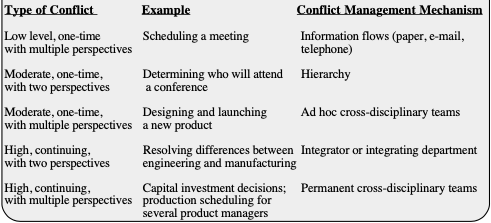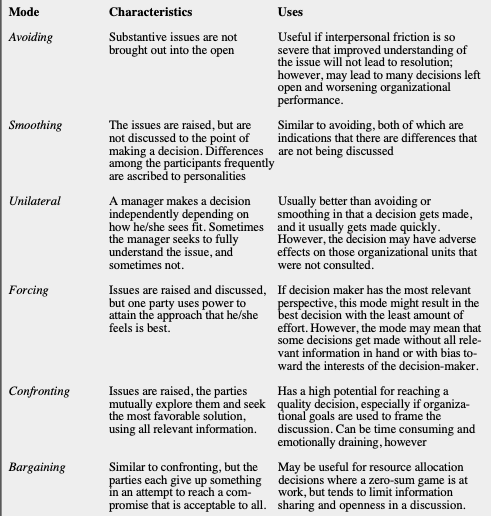Given that a conflict – or at least the predisposition for it – is thought to be a natural feature of the human experience, it is guaranteed to occur, especially in the turbulent world of healthcare, with its hierarchical organizational structure and complicated care challenges. It is critical to emphasize the potential benefits of effective dispute management and effective team building. Positive management encourages respect for each other’s roles, enhances relations, reduces absenteeism and staff turnover, and benefits new employees who would find it challenging to integrate into existing teams. Additionally, if disagreement is not adequately managed, it will directly affect the quantity and caliber of patient treatment. The credibility of nurses, the profession, and the healthcare system as a whole are at risk due to poor customer care provision.
The emphasis of dispute in teams is on tasks and relationships, but there are also other predisposing factors like the nature of the disagreement or even the people involved. There are three basic categories of relationship-founded conflict in the academic dimension: intrapersonal, interpersonal, and inter-group (Thomas & Inkson, 2009). Internal disagreement and conflict that arises inside the person, such as role uncertainty, are examples of intrapersonal conflict. Intergroup conflict encompasses two or more teams that, for instance, do not have the same organizational objectives. Interpersonal conflict occurs when two or more persons with opposing ideas or goals interact, which can result in harassment and anxiety. Relationship-based disagreements, conflicts, and animosity between two or more teammates constitute a typical interpersonal conflict. This should be recognized and addressed since it may have a detrimental effect on the effectiveness of the team.
Teammates may feel silenced or controlled as a byproduct of hierarchy. Processing conflict that results from opposing viewpoints on how an activity should be done may also have an impact on how well a person performs on the job (Hasson, 2006). Consequently, it is crucial that the team leader handles the disagreement delicately to enable group debate and solving problems, for instance, via group monitoring or a platform for team communication.
Clinical team conflict may lead to progress or destruction based on how it is handled. This is crucial since the way a team handles this conflict affects the outcome. Stress, illness, decreased job satisfaction, shoddy interactions, mistrust, ruined inter-group interactions, resistance, and limited function are some of the disruptive effects of conflict (Behfar & Goldberg, 2017). Counterproductive circumstances like the ones stated above jeopardize patient treatment and comfort, a person’s professional license, and the organization’s image in the healthcare industry as a whole.
At this point, it is essential to stress that if handled appropriately, conflict resolution and management may be advantageous. However, doing so requires open communication, active listening, and comprehension of the perceived points of contention. The greatest ways to avert conflict are said to be found by identifying its warning signals and tracking down its sources. By identifying early warning indicators and responding to them, escalation can be stopped.
Recognizing a person’s conflict management style improves our capacity to handle it more skillfully. The clinical team’s functions must also be recognized and understood in order to facilitate teamwork. Collaboration within an interdisciplinary team affects patient engagement and collective decision, making it crucial for improved patient outcomes and contentment. A person who is an excellent leader will exhibit traits like honesty, resilience, effective engagement, and confidence (Behfar & Goldberg, 2017). A successful leader will be personable, able to assign tasks efficiently, escalate issues, knowledgeable and creative, and motivated to enhance teamwork via education and training. All of these traits are consistent with a transformational approach and include avoiding certain behaviors. Effective leadership essentially contributes to the constructive prevention or resolution of conflict through improved morale and a functioning team.
However, within the scope given, it should be recognized that significant leaders should rely on a proper theory of conflict management. Fortunately, the scholarly dimension has explored numerous practices that can be utilized in this regard. For example, Young (2013) provided a well-developed summary of conflict types and the ways they can be resolved, which is depicted in Table 1. Moreover, there is a significant model that involves efficient modes of conflict management (Table 2). It might be assumed that these theoretical pillars may serve as a new foundation for dealing with conflicts in United Healthcare, Inc. They seem flexible, so many other recognized approaches can be integrated in the future.
Table 1. Types of conflict management

Table 2. Modes of conflict management

There is a convincing rationale for implementing the suggested policy. Conflict and change are entwined because one can lead to the other. Conflict may arise as a result of resistance, unfavorable impressions, uncertainty, and a lack of awareness, for instance, when unanticipated change is combined with insignificant communication (Williams, 1997). Since individuals are more accountable than the circumstances or team goals are, and since this depends on mental self-confidence, successful leadership is inherent in managing people. If one cannot adjust, change can cause stress. For instance, joining a new team is a shift for both the new member and the current ones. Potential conflict will either emerge or not, depending on how each person and the team management handle this issue.
Conflict may stimulate and urge change if team functioning has grown stagnant, boost performance, and stimulate critical thinking when utilized constructively. It is said that conflict involving divergent viewpoints and ideas has the potential to be beneficial, leading to increased team productivity and creativity. Escalation may be avoided by discussion and problem-solving through management mediation (Thomas & Inkson, 2009). Regular conflict status reviews are necessary, and continuous management must take into consideration variables, including feelings, actions, and results, referring to the theoretical pillars suggested above. Conflict develops a tolerance for one another, debate, and diplomacy, as well as helps people understand their jobs better. It also draws attention to variety and divergent but equally valuable opinions. This is relevant, for instance, when there is a generational difference within a team and compromise is required.
To conclude, delivering the highest level of patient-centered care requires meeting legal, professional, and ethical obligations; as a result, conflict should be handled and used constructively to avoid jeopardizing patient welfare, care, and comfort. In order to minimize near-misses or substantial negative events affecting patient care, clinical administration is to be implemented inside organizations to guarantee the risk is managed. Conflict risk, for example, should be controlled or managed at all levels. Conflict will arise in even the most successful and productive teams. It has the potential to be a catalyst for creativity, development, and efficiency if it is properly controlled. Conflict management and constructive resolution support mutual respect for each other’s roles among health professionals, enhance team members’ welfare, enable optimal team performance, and eventually support the provision of high-quality patient care.
References
Behfar, K., & Goldberg, R. (2017). Conflict management in teams. SSRN. Web.
Hasson, R. (2006). How to resolve board disputes more effectively. MIT Sloan Management Review, 48(1), 77–80.
Thomas, D. C., & Inkson, K. (2009). Communicating, negotiating, and resolving conflicts across cultures. Homeworksmontana.com. Web.
Williams, M. J. (1997). Don’t avoid conflicts – manage them. Harvard Management Update. Web.
Young, D. W. (2013). Note of conflict management. The Crimson Group. Web.